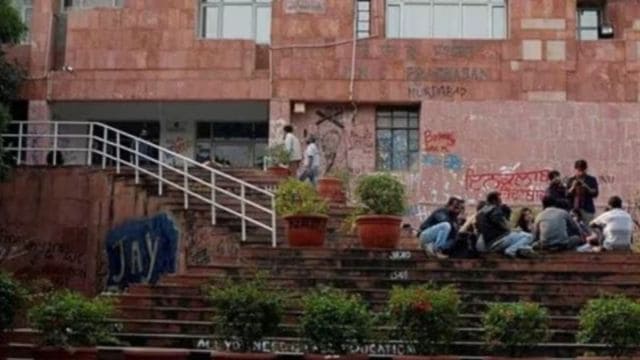Rs 20,000 fines, expulsion: At JNU, enquiries against students soar from 5 to 97 after new rules imposed in 2023
The manual, approved by the university’s Executive Council on November 24, 2023, sets out “rules of discipline and proper conduct of students of JNU”
 Student leaders have alleged that the manual has become an instrument of intimidation (Archive)
Student leaders have alleged that the manual has become an instrument of intimidation (Archive)Fines of up to Rs 20,000, suspension, or expulsion for demonstrations within 100 meters of academic or administrative buildings, and ban on protests outside the residence of university officials — the Chief Proctor Office Manual at the Jawaharlal Nehru University (JNU) had brought these and more rules in force in November 2023. Since then, the number of disciplinary or proctoral enquiries initiated against students has gone up from just five in 2023 to 97 last year and 40 till July this year, The Indian Express has learnt.
The significant surge last year came at a time when the JNU saw the formation of a student union after a gap of four years.
The manual, approved by the university’s Executive Council on November 24, 2023, sets out “rules of discipline and proper conduct of students of JNU”. Under the rules, even organising a freshers’ party, farewell or birthday event without permission can lead to Rs 6,000 fine or “compulsory community service”.
Student leaders have alleged that the manual has become an instrument of intimidation. Speaking to The Indian Express, JNU Student Union President Nitish Kumar said, “When students protest against sexual harassment, or water crisis on campus, they are slapped with proctorial inquiries and fines. When the union protested in March against the Dean of Students, at least 30 students were served inquiries.”
“If a student is fined five times, the student will be expelled. We are asked to appeal, but nothing changes, no inquiry gets quashed.” he stated, adding, “The culture of dissent is being attacked and politically active students are being fined to ensure that they do not participate in the student union elections.”
According to official records accessed by The Indian Express, “no proctorial enquiries have been overturned or quashed. However, appeals filed by individual students against the fines or punishments imposed have been dismissed/fine waived off/fine reduced…”
Repeated calls, emails and messages to Chief Proctor N Janardhana Raju, Vice-Chancellor Pandit, and the university’s media relations office went unanswered.
The Indian Express earlier reported that on December 13, 2023, the Chief Proctor issued show cause notices to 16 students, including then JNUSU president Aishe Ghosh, after they demonstrated against the water crisis in hostel blocks. The notice stated that she led “a protest demonstration of 400-500 students in front of the Hon’ble V-C’s residence” in September that year.
Earlier this year, on April 5, two union office bearers — President Dhananjay and General Secretary Priyanshi Arya — were summoned for allegedly obstructing the North Gate during a protest over sexual harassment.
The courts have also intervened. Last April, the Delhi High Court stayed the rustication of PhD student Ankita Singh, who said she had been expelled without any inquiry or opportunity to respond. The court noted that this was “not the first case of JNU taking coercive and punitive action by rustication of students, in complete derogation of its own statutes and in total disregard of the principles of natural justice and fair play.” Singh was ordered to be “forthwith readmitted.”
JNU’s reliance on disciplinary action has been a point of controversy for years. In 2020, former Vice-Chancellor M. Jagadesh Kumar, facing student unrest, indicated in an interview with The Indian Express that he was prepared to be “lenient” if students submitted to proctorial inquiries.He nonetheless refused to suspend proceedings against around 300 students, saying disciplinary processes would not be withdrawn.
Current Vice-Chancellor Santishree Dhulipudi Pandit, who took office in 2022, had earlier defended the manual, insisting that the rules are not new but simply codified. “These are the same rules that have been in place since 1969, I have not brought in any change. The rules are just fine-tuned and made legally sound on the directions of the Delhi High Court,” she told The Indian Express in 2023 when it first reported about the manual.
Students remain unconvinced. In June, the JNUSU launched an indefinite hunger strike, demanding, among other things, that all proctorial inquiries be revoked.







